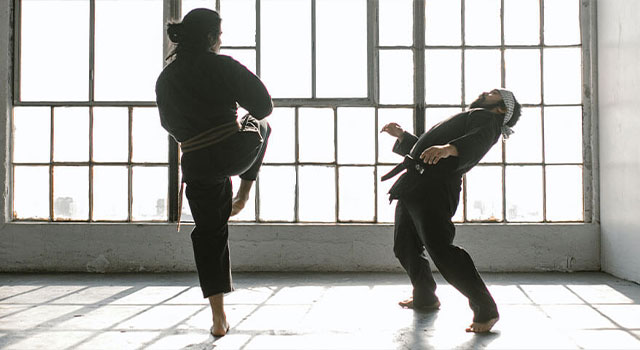 As a martial artist, you want to show your hard-earned skills at every match. While martial artists know the importance of being physically fit, many don’t realize that their visual skills also play a central role in their performance.
As a martial artist, you want to show your hard-earned skills at every match. While martial artists know the importance of being physically fit, many don’t realize that their visual skills also play a central role in their performance.
Your eyes’ ability to focus, react instantaneously to another’s moves, and see movement from the edge of your visual field are all critical skills to succeed in martial arts. That’s where sports vision training comes in. Regardless of your age or level of ability, sports vision training can boost your visual skills to help you up your game.
What is Sports Vision Training?
Sports vision training is a customized program designed to enhance the communication between your eyes, brain, and body. Athletes who receive sports vision training are able to process visual information faster and react more precisely to what they see on the mat, field or track.
Sports vision training employs a unique set of strategies and exercises that enhances eye-brain communication so the body can respond more quickly, effectively and accurately. Visual skills such as depth perception, hand-eye coordination, dynamic visual acuity and peripheral awareness are all [emphasized] during sports vision training.
Visual Skills for Martial Arts
Visual skills allow the brain to quickly process the images received by the eyes and then relay this information to the body. People who do judo, karate, kung fu, Muay Thai, Krav Maga, Jiu-Jitsu, Aikido among other forms of martial arts rely heavily on these and other visual skills to succeed:
Dynamic Visual Acuity
This is at times referred to as "vision in motion," or the capacity to see, understand and respond quickly to moving objects. In martial arts, fighters need dynamic visual acuity to accurately follow their opponents’ sudden kicks, throws or punches.
Eye-Hand Coordination
There is a three-way information pathway between our limbs, eye and brain. Any miscommunication between these three can impact eye-hand coordination. If the information is not conveyed quickly and accurately enough, the body may not be able to react in time to fend off an opponent.
From parrying a punch in boxing to grappling in Jiu-Jitsu, hand-eye coordination is required for a wide range of maneuvers and situations. It's also important for enhancing your general timing in offensive and defensive reactions.
Peripheral Awareness
Your ability to recognize what's going on at the edge of your vision is known as peripheral awareness. A fighter with a well-developed peripheral field will be able to see everything at once and perceive the battle's flow.
Combatants of all levels, amateur and professional, can benefit from improving their visual abilities. Giving martial artists the ability to develop their sports vision skills has been shown to help them perform at a higher level.
Contact us at Impact Vision Therapy to schedule your appointment with one of our sports vision experts and discover how sports vision training can help you excel in martial arts.
Our practice serves patients from Pueblo, Colorado Springs, Castle Pines, and Parker, Colorado and surrounding communities.
